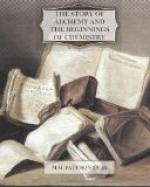Cagliostro entered Strassburg in state, amid an admiring crowd, who regarded him as more than human. Rumour said he had amassed vast riches by the transmutation of base metals into gold. Some people in the crowd said he was the wandering Jew, others that he had been present at the marriage feast of Cana, some asserted he was born before the deluge, and one supposed he might be the devil. The goldsmith whom he had cheated of sixty ounces of gold many years before was in the crowd, and, recognising him, tried to stop the carriage, shouting: “Joseph Balsamo! It is Joseph! Rogue, where are my sixty ounces of gold?” “Cagliostro scarcely deigned to glance at the furious goldsmith; but in the middle of the profound silence which the incident occasioned among the crowd, a voice, apparently in the clouds, uttered with great distinctness the following words: ’Remove this lunatic, who is possessed by infernal spirits.’ Some of the spectators fell on their knees, others seized the unfortunate goldsmith, and the brilliant cortege passed on” (Waite).
From Strassburg Cagliostro* went to Paris, where he lived in great splendour, curing diseases, making gold and diamonds, mystifying and duping people of all ranks by the splendid ritual and gorgeous feasting of his secret society, and amassing riches. He got entangled in the affair of the Diamond Necklace, and left Paris. Trying to advance his society in Italy he was arrested by the agents of the Inquisition, and imprisoned, then tried, and condemned to death. The sentence was commuted to perpetual imprisonment. After two years in the prison of San Angelo he died at the age of fifty.
Transcriber’s Note: Original “Cagliosto”.
CHAPTER IX.
PARACELSUS AND SOME OTHER ALCHEMISTS.
The accounts which have come to us of the men who followed the pursuit of the One Thing are vague, scrappy, and confusing.
Alchemical books abound in quotations from the writings of Geber. Five hundred treatises were attributed to this man during the middle ages, yet we have no certain knowledge of his name, or of the time or place of his birth. Hoefer says he probably lived in the middle of the 8th century, was a native of Mesopotamia, and was named Djabar Al-Konfi. Waite calls him Abou Moussah Djafar al-Sofi. Some of the mediaeval adepts spoke of him as the King of India, others called him a Prince of Persia. Most of the Arabian writers on alchemy and medicine, after the 9th century, refer to Geber as their master.
All the MSS. of writings attributed to Geber which have been examined are in Latin, but the library of Leyden is said to possess some works by him written in Arabic. These MSS. contain directions for preparing many metals, salts, acids, oils, etc., and for performing such operations as distillation, cupellation, dissolution, calcination, and the like.




